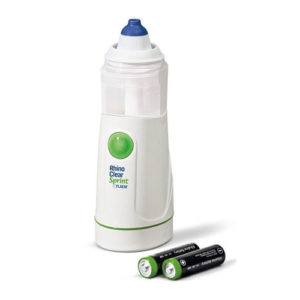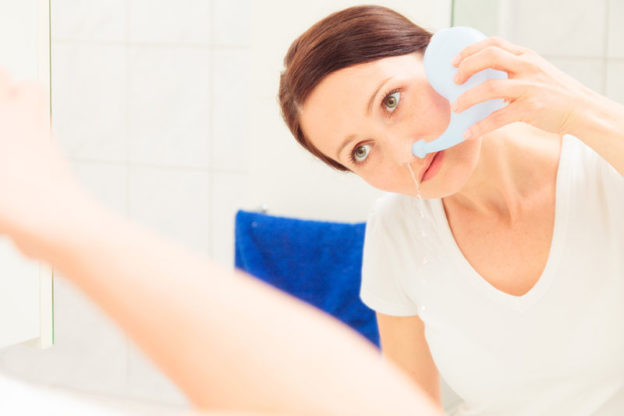A neti pot is a simple way of cleansing the sinus passages. A neti pot looks like a tea pot with a longer spout designed to pour into your nose. You either tilt your head upwards or lie backwards, and then pour the water into the nostrils. Usually the water is mixed with a saline solution and sometimes some baking soda. At a minimum, distilled water should be used. Neti pots have been used for thousands of years in different cultures and the actual principle has not changed much. There are now neti pot alternatives however that are easier to use and may be more effective.
Why Use a Neti Pot or Neti Pot Alternative?
Neti pots and similar devices are used to cleanse the nasal passages when they are congested and provide moisture when exposed to a dry environment. When a neti pot it is used to clean the nasal passages it is called nasal irrigation or nasal lavage. Nasal lavage can be an effective way to manage chronic rhinosinusitis caused by allergies or illness. Certain conditions like COPD can also result in sinus congestion that may be helped with a saline rinse. Individuals without allergies or a health condition may still use a neti pot or neti pot alternative because they live in a dry environment or find that it improves their breathing.
Atomizers: Powered Alternatives to the Neti Pot
 Atomizers are like neti pots that are battery powered. They are superior to neti pots however in that you do not have to pour water up your nose while you awkwardly tilt your head. An atomizer like the RhinoClear is able to propel the liquid up into the nose and sinus passages using a battery-powered motor. The same saline solution can be used to cleanse the sinuses with an atomizer without the potential messiness of using a neti pot. With an atomizer or nasal spray device you can stand up straight while you use it. This is more convenient and less messy than pouring water up your nose over a sink.
Atomizers are like neti pots that are battery powered. They are superior to neti pots however in that you do not have to pour water up your nose while you awkwardly tilt your head. An atomizer like the RhinoClear is able to propel the liquid up into the nose and sinus passages using a battery-powered motor. The same saline solution can be used to cleanse the sinuses with an atomizer without the potential messiness of using a neti pot. With an atomizer or nasal spray device you can stand up straight while you use it. This is more convenient and less messy than pouring water up your nose over a sink.
While both a neti pot and an atomizer are portable, it is difficult to use a neti pot when you are not near a sink or anywhere in public. An atomizer can fit in your bag, and you do not need to be near a sink to use it. Just keep some distilled water with saline with you or pre-fill the atomizer before you leave the house. You will still likely feel like you need to decongest your nose even with the atomizer, but this is good and means that you are clearing the nasal passages.
You can think of the RhinoClear as an automatic neti pot. A battery powered neti pot is able to propel a saline solution up into the nose without the need to tilt your head. Many have found that the RhinoClear is better than a neti pot because it is easy-to-use and portable.
Children and Nasal Rinsing
FDA guidance states that children as young as 2 may use nasal rinsing devices like neti pots. That is the age when some children are diagnosed with allergies. When deciding whether to use a nasal rinsing device on your child, it is best to consult with a pediatrician first. The RhinoClear comes with multiple nasal adaptors to fit different sized noses, and can be used on children as long as the adaptor fits. For infants it is usually recommended that a bulb syringe be used instead of a neti pot or atomizer. A neti pot is too large and uses more water than is needed and an atomizer will not fit an infants nose properly.
Using Safe Water When Rinsing Your Sinuses
Using a safe water source is essential whether you are using a neti pot or an alternative. You should never use untreated tap water to rinse your sinuses. Tap water can be contaminated and you do not want to introduce harmful bacteria into your sinus passages. If you can not get distilled water, you can boil tap water for about 5 minutes and allow it to cool until it is lukewarm. The water will then be safe to use but should only be stored for 24 hours. You should also check to see if you can boil any parts of your device or neti pot to sterilize them. If not, you may need to replace the device every few months for safety. The parts of the RhinoClear that touch the nose are all removable and washable, and it is usually recommended that these parts be sterilized before the first time they are used.
Research
Is Rinsing Your Sinuses With Neti Pots Safe? – FDA Guidance (https://www.fda.gov)


